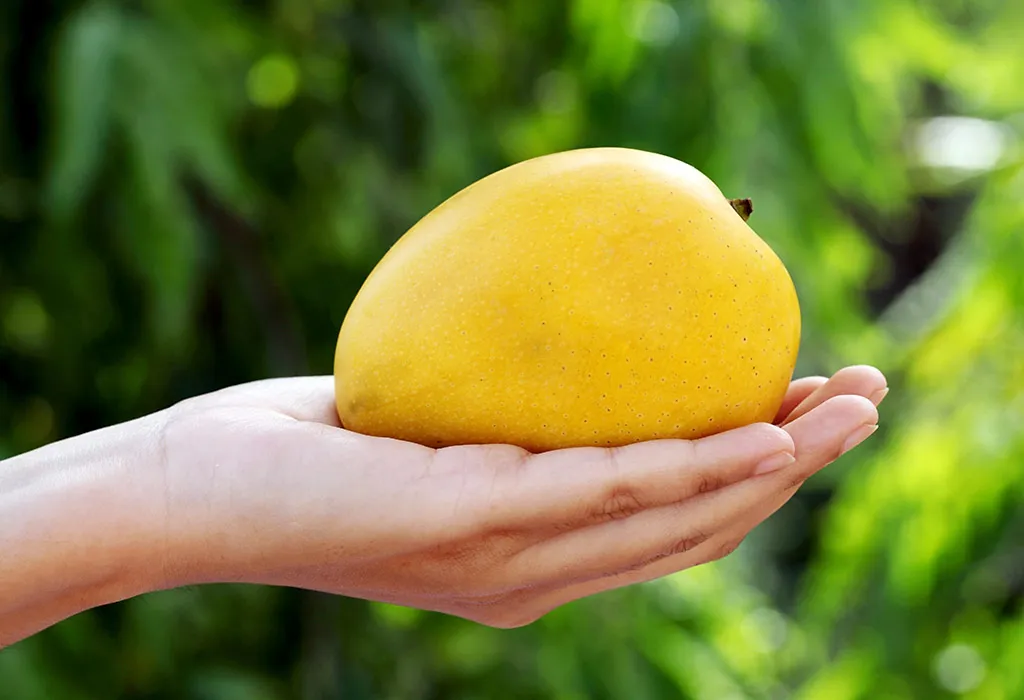Also Read:
Eating Apples in Pregnancy
Eating Oranges when Pregnant
Consuming Banana during Pregnancy

When you find out that you are pregnant, you realise that you need to make certain changes in your lifestyle. Yes, you cannot eat anything or everything as you did before. Your body will go through a lot of changes during pregnancy. During the nine crucial months of pregnancy, you will receive a lot of well-meaning advice from friends and relatives about the type of food you should eat during pregnancy, and it can leave you all confused. If you love eating fruits, especially, mangoes, you might wonder whether you can eat it or not during pregnancy. The same will happen with other food items too. But today we will be talking about one fruit – mangoes! Read this article to find out the relation between mango and pregnancy.

You may wonder if mango is good for pregnancy. Eating ripe mangoes in pregnancy has its own advantages, provided the portions you eat are monitored properly so that you don’t eat much. Being rich in Vitamins A, B6 and C, mangoes provide the essential nutrients that a woman needs during pregnancy. Mangoes are also rich in folic acid, potassium, and iron.
It is believed that eating mango in pregnancy can increase heat in the body, otherwise known as ‘thermogenesis’. But that may not be true! Spicy foods, ginger, chillies, and strong herbal products need energy to digest and process, and are responsible for increasing body heat. There is, however, no proof that eating mangoes increase heat or cause harm to the baby.
Mangoes are a great source of energy and antioxidants which are essential during the trying period of pregnancy. However, while buying mangoes, make sure you don’t pick out the ones that are chemically ripened. And like with any other fruit or vegetable, you should eat mangoes when they are in the season. However, it is suggested that you consult with your doctor before including mangoes in your diet.
Mangoes are packed with nutrients and vitamins that can meet the nutritional requirements of a pregnant woman to an extent. Mangoes are a rich source of Vitamin A and Vitamin C and are packed with flavonoids like alpha and beta carotene & beta-cryptoxanthin. They also contain potassium, folate and copper in good quantities. To know more about the nutritional value of mangoes, take a look at the chart below. The chart below lists the nutritional value of 100 gms edible portion of kesar varieties of mangoes.
| Principle | Nutrient Value |
| Energy | 55 Kcal |
| Carbohydrates | 11 g |
| Protein | 0.5 g |
| Total Fat | 0.5 g |
| Cholesterol | 0 mg |
| Dietary Fibre | 2.02 g |
| Niacin | 0.26 mg |
| Pantothenic acid | 0.11 mg |
| Pyridoxine (Vitamin B-6) | 0.1 mg |
| Riboflavin | 0.04 mg |
| Thiamin | 0.03 mg |
| Vitamin C | 29 mg |
| Vitamin A | 210 mcg |
| Vitamin E | 0.2 mg |
| Sodium | 1.4 mg |
| Potassium | 143 mg |
| Calcium | 15.8 mg |
| Copper | 0.07 mg |
| Iron | 0.43 mg |
| Magnesium | 12.53 mg |
| Manganese | 0.02 mg |
| Zinc | 0.1 mg |
Mangoes are high in calories but can be a great source of energy. You will need a lot of energy during pregnancy, especially in the third trimester. If your doctor has asked you to increase your calorie intake, you can add mangoes to your diet. However, moderation is the key here so do not eat beyond one mango per day.
As mangoes have a unique sweet and sour taste, they are a favourite with pregnant women as eating mangoes may help lessen the feeling of nausea to a great extent. Based on their nutritional quotients, the following are the health benefits of eating mangoes during pregnancy:
1. Pregnant women need iron to prevent anaemia, which is a common condition during pregnancy. Eating mangoes can meet your iron requirements. Even if you eat 1 mango every day, it can increase your red blood cells count which can help fight anaemia.
2. Mangoes contain folic acid in abundance which aids fetal development during pregnancy. As mangoes are rich in folic acid, consuming them in the first trimester of pregnancy can assist in the growth of the nervous system of the foetus. Neural tube defects that happen in early pregnancy can also be averted by consuming mangoes in the right quantities.
3. Mangoes are a good source of dietary fibre, which is necessary to keep the digestive system in good health. In order to overcome the problem of constipation during pregnancy, you can eat mangoes. However, do keep a watch on the quantity, as excessive intake can lead to gases and an uncomfortable feeling.
4. As mangoes are rich in Vitamin C, they act as a potent antioxidant, preventing the free radicals in the human body from growing. Vitamin C in mangoes can also lower the risk of preterm labour.
5. Mangoes are rich in Vitamin B6 which, like folic acid, is ideal for the development of the nervous system.
6. Mangoes contain Vitamin A, which is useful for the development of bones and teeth of a baby. It also nourishes the eyes and nervous system.
7. Mangoes are a rich source of magnesium, which is a natural cure for high blood pressure and prevents preeclampsia. Since preeclampsia can lead to seizures during pregnancy, adding mangoes to your diet can help.
8. The sweet and sour taste of mangoes can help address morning sickness, a common pregnancy condition. Vitamin B6 in mangoes can also make your mornings bearable.
9. Potassium helps maintain fluid balance in the body, which is especially critical during pregnancy. Fluid accumulation in the lower limbs can hamper movement and excess fluid can be dangerous too. As mangoes are a good source of potassium and you can include them in your diet.
10. The natural sugars present in mangoes make sure that you do not succumb to sugar cravings and prevent you from consuming foods that contain synthetic sugars and preservatives.

While eating naturally ripened mangoes does not have any major side effects, artificially ripened mangoes may contain traces of calcium carbide, a ripening agent, which can expose the mother and baby to the ill-effects of arsenic and phosphorus. Here are a few side effects of eating artificially ripened mangoes.
It is not always easy to tell if the mangoes you are buying are artificially ripened or not. A few simple precautions can help lower the risk. These include –
Another useful tip is to buy raw mangoes then ripen them at home. This is the only way to ensure that they are free of calcium carbide.
This mango smoothie recipe is delicious and safe during pregnancy, and also takes care of those sweet cravings. You can easily make this at home using ingredients available to you.
Ingredients
Preparation Time
5-10 minutes
Servings
2 servings
How to Make
Mango contains natural heat, which when consumed in excess can cause miscarriage, especially in the third trimester. Make sure you eat mangoes in a limited amount.
Mangoes, raw or ripe, can be consumed during pregnancy and are safe. Ripe mangoes stimulate appetite, help in digestion, and can help improve complexion. Raw mangoes contain vitamins that fight acidity and morning sickness, making it completely safe for consumption during pregnancy.
Excess consumption of mango during pregnancy first trimester and last trimester can lead to gestational diabetes, hence keeping the portions limited is a must.
If you are keen on eating a fully ripe mango, make sure you have checked for the following before gulping it down:
Yes, you can eat mango pickle during pregnancy, but in a limited amount.
Dry mango powder has a variety of benefits, such as preventing iron deficiency, preventing acidity, and improving skin tone. You can safely consume it during pregnancy.
If the quantity of mangoes consumed is within permissible limits, you can consume them during pregnancy. But you should always speak to your doctor about including mango milkshakes and mango slices in your daily diet. Consult your doctor then include this sweet fruit in your pregnancy diet.
References/Resources:
1. MANGO; U.S. Department of Agriculture; https://fdc.nal.usda.gov/fdc-app.html#/food-details/454102/nutrients; April 2019
2. Mango-licious: The Top 6 Health Benefits of Mango; Cleveland Clinic; https://health.clevelandclinic.org/mango-benefits/; July 2023
3. Pregnancy nutrition: Foods to avoid during pregnancy; Mayo Clinic; https://www.mayoclinic.org/healthy-lifestyle/pregnancy-week-by-week/in-depth/pregnancy-nutrition/art-20043844; May 2023
4. Pregnancy Nutrition; American Pregnancy Association; https://americanpregnancy.org/healthy-pregnancy/pregnancy-health-wellness/pregnancy-nutrition/
5. Maternal nutrition; UNICEF; https://www.unicef.org/nutrition/maternal